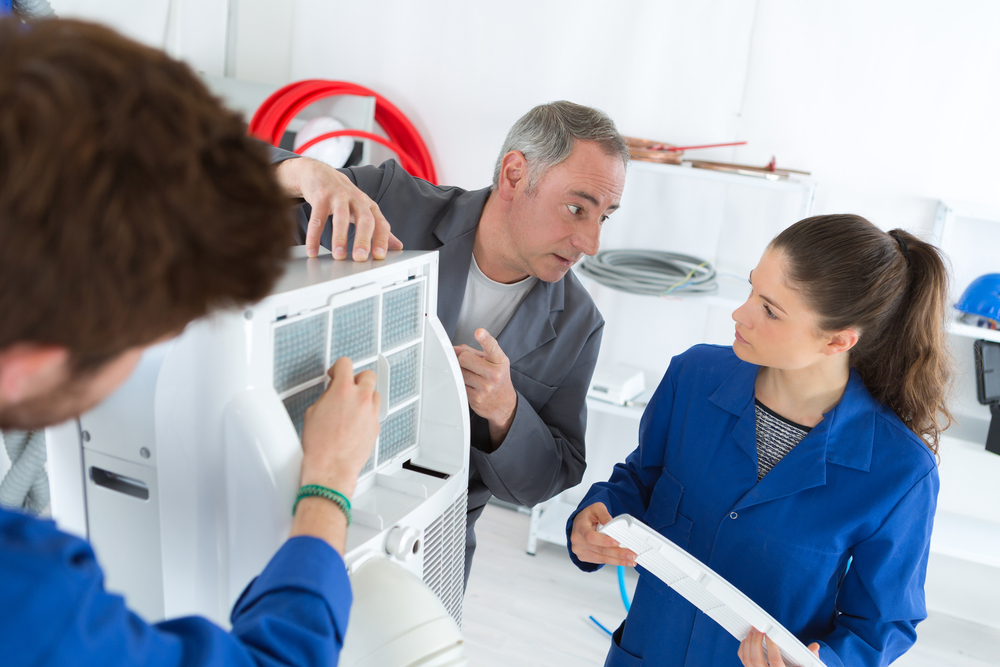
Understanding the Lifespan of Your HVAC System: When to Repair vs. Replace
May 9, 2024 6:10 pm Leave your thoughtsYour HVAC system plays a crucial role in keeping your home comfortable throughout the year, regulating temperature and maintaining indoor air quality. Like any mechanical system, HVAC systems have a finite lifespan, and understanding when to repair or replace your unit is essential for ensuring optimal performance and efficiency. In this blog post, we will explore the factors that influence the lifespan of your HVAC system, as well as guidelines for determining whether it’s time to repair or replace your unit. Additionally, we will provide HVAC maintenance tips to help extend the longevity of your system and maximize its efficiency.
HVAC System Lifespan
The lifespan of an HVAC system can vary depending on several factors, including the quality of the unit, how well it has been maintained, and the frequency of use. On average, most HVAC systems have a lifespan of approximately 10-15 years for air conditioners and 15-20 years for furnaces. Regular maintenance and proper care can help prolong the life of your HVAC system, while neglecting maintenance can lead to premature wear and tear, resulting in costly repairs or the need for early replacement.
Repair or Replace HVAC: Factors to Consider
When your HVAC system starts showing signs of trouble, such as inconsistent temperatures, unusual noises, or frequent breakdowns, it can be challenging to determine whether it’s best to repair or replace the unit. Several factors can help guide this decision:
1. Age of the Unit: As mentioned earlier, the age of your HVAC system is a key factor in determining whether to repair or replace. Older units nearing the end of their expected lifespan may be more prone to breakdowns and may not operate as efficiently as newer models. In this case, replacing the unit may be a more cost-effective solution in the long run.
2. Energy Efficiency: Modern HVAC systems are designed to be more energy-efficient than older models, leading to lower utility bills and reduced environmental impact. If your current unit is outdated and inefficient, replacing it with a newer, more energy-efficient model can result in significant savings on your energy costs over time.
3. Repair Costs: When considering whether to repair or replace your HVAC system, it’s essential to weigh the cost of repairs against the potential benefits of a new unit. If the cost of repairs is significant and the unit is nearing the end of its lifespan, investing in a new system may be a more practical and cost-effective solution.
HVAC Maintenance Tips
To prolong the lifespan of your HVAC system and ensure optimal performance, regular maintenance is crucial. Here are some essential HVAC maintenance tips to help keep your system running smoothly:
1. Change Air Filters: Regularly changing the air filters in your HVAC system can improve airflow, reduce strain on the unit, and enhance indoor air quality. Dirty filters can cause the system to work harder, leading to increased energy consumption and potential breakdowns.
2. Schedule Professional Tune-Ups: Annual maintenance by a qualified HVAC technician can help identify potential issues before they escalate into major problems. During a tune-up, the technician will inspect and clean the components of your HVAC system, ensuring that it operates efficiently and effectively.
3. Clean and Clear Vents and Ducts: Dirty or blocked vents and ducts can restrict airflow and reduce the efficiency of your HVAC system. Regularly inspecting and cleaning vents and ducts can help prevent airflow issues and maintain optimal performance.
4. Inspect Thermostat Settings: Ensure that your thermostat is set correctly to maximize energy efficiency and comfort. Programmable thermostats can help regulate temperature settings based on your schedule, reducing energy consumption when you are away from home.
5. Seal Air Leaks: Leaky ductwork or gaps around windows and doors can cause air loss, reducing the efficiency of your HVAC system. Sealing air leaks can improve energy efficiency and reduce heating and cooling costs.
By following these HVAC maintenance tips and staying proactive about caring for your system, you can help extend its lifespan, improve its efficiency, and minimize the need for costly repairs or replacement.
Summary
Understanding the lifespan of your HVAC system and knowing when to repair or replace it are vital for maintaining a comfortable and energy-efficient home. By considering factors such as the age of the unit, energy efficiency, and repair costs, you can make informed decisions about the best course of action for your HVAC system. Additionally, implementing regular maintenance practices can help extend the longevity of your HVAC system and ensure that it continues to operate optimally for years to come.
Need a HVAC Contractor in Oklahoma City, OK?
Family owned and operated since 1994, we have earned a reputation for providing quality, timely, and affordable heating and air conditioning services to the residents and businesses of Oklahoma City and surrounding areas. With a combined 39 years of experience, our knowledgeable technicians specialize in a wide range of services including the sales, service, and installation of heating and air conditioning systems, filtration systems, air decontaminating UV lamps, dehumidifiers, humidifiers, carbon monoxide detectors, preventative maintenance, air quality systems, and more. We pride ourselves on installing high-efficiency comfort systems designed to be the most cost-effective on the market and geared to your particular property. Contact us today to learn more about what we can do for you!
Categorised in: HVAC, HVAC Maintenance, HVAC Repair, HVAC Service
This post was written by admin
